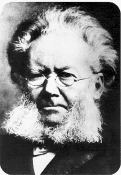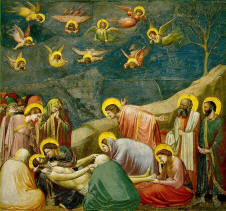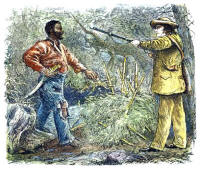|
Tragedy and the Tragic Form: An Argument For the Pessimistic View of Life No one really understands the genre of tragedy; the art form began with the Greeks, probably in the 6th century B.C.E., and consists of only 33 plays that took place between 430 and 355 B.C.E., or a brief 75 years. Yet no other expression of humanity's fears, pains, or justifications for life itself manifests itself as strongly. The seminar planned for the spring will examine the idea of tragedy and the tragic mood in all its social and philosophic implications. In particular, I want students to see that tragedy stems from the much misunderstood philosophic concept of pessimism, the wellspring of creativity that responds to passion, not reason. Whatever one's academic interests, this class is first and foremost about the urge to create, to turn unanswerable, senseless suffering into meaningful artistic achievements.
Many people believe that true tragedy is no longer possible, that we have lost the ability to tap into our hidden, instinctual feelings because reason plays such an important part in our lives. But I want to examine how true this is. Novels, for instance, may best express the spirit of tragedy today, especially books that appeal to our collective, national consciences. A work such as William Styron's The Confessions of Nat Turner, in which a slave leads a futile, bloody revolt, repeatedly asks "why must we suffer? how did this happen to us?" Styron's novel, itself controversial, has a remarkable comparison to a work such as Euripides' The Bacchus, demonstrating that so long as people fight against the unconquerable tragedy can be relevant, even in our own world. What
tragedy means has never been an easy question; but in its many formal
aspects, tragedy remains an important cultural concept in Western
literature, visual art, and philosophy. Toward this The course discussion will focus principally upon the development of the idea of tragedy and the tragic mood in all its social and philosophic implications. The spirit of tragedy is one of pessimism, a much misunderstood philosophic concept that is the wellspring of creativity. In this course we will look at the more traditional ideas about tragedy (ideas frequently misinterpreted in history and today), beginning with Aeschylus and the Greek drama. However, attention will as well be paid to forms not usually associated with tragedy--visual art, the Bible, the novel, historic events, and Freudian psychology--in an attempt to further understand the impetus that gives rise to the expression of tragedy, what that expression says about us, how the pessimistic spirit equates with creativity, and why that expression has changed in the modern world. T he question of what tragedy is has never been an easy one. It is far simpler, in fact, to define the many elements that constitute the tragic, thereafter using them as touchstones in an attempt to formulate a necessary criteria for such an elusive term. Yet tragedy, in its many formal aspects, is an important cultural concept in Western literature, visual art, and philosophy; toward this end the purpose of this course will be to explore the idea of tragedy as a universal expression of humanity's attempts at reconciling life with the fears and pains of living. The term itself demonstrates the elusiveness of the concept. In literature, we think that all tragedies must end in death or that heroes demonstrate fatal "flaws." We describe well-documented lives as being tragic by the degree to which they differ from our own experiences--biography becomes a voyeuristic necessity not unlike Aristotle's concept of catharsis. Events such as the Challenger space disaster must qualify as tragic, since people lost their lives seemingly bravely, nobly, and certainly publicly.By examining not only the purest of tragic forms, the drama, but also works not ordinarily associated with the genre, we will discover that tragedy suggests more an innate mood and questioning about life than a term given to easy definition. We will also discuss how "pessimism," that misunderstood clich頴hat erroneously stands as the opposite of "optimism," is at the heart of creativity. For the Greeks, life did not make sense but tragedy as an art form did. Today we attempt to impose order and meaning on the meaningless by redefining the tragic in new social, artistic, and philosophic ways. Tragedy seeks understanding and purpose in otherwise purposeless existences--to understand that need is to touch the universality of life. Course Outline Part I. The Tradition of Tragedy: Understandings and Misunderstandings; Pessimism and the Pessimistic Spirit. Traditional Tragic Forms in literature, religion, philosophy. Week One: Introduction to course; background on the Attic drama;
tragedy as an expression for the Week Two: Aeschylus, Oresteia; Sophocles, Oedipus Tyrannus Week Three: Sophocles, Oedipus at Colonus, Antigone Week Four: Eurpides, Medea; Aristotle's Poetics (Book Six) Week Five: Religion and the tragic spirit: The Book of Job Week Six: Pessimism and Religion: Pagan/Christian. Augustine and the Week Seven: Variations on the traditional: Shakespeare, Othello
Part II. Redefining the Tragic:
visual art, psychology, philosophy, Week Eight: Philosophic questions and answers: Nietzsche, "The Birth
of Tragedy"; Hegelian dialectic Week Nine: The New Testament: Christ as literary, tragic figure. Week Ten: Modernity: questions about religion and fate, free will and
determinism; Freudian Week Eleven: Tragedy in the visual arts, Goya and Van Gogh; does the
author's life equate to Week Twelve: Modern considerations: Ibsen, Ghosts; O'Neill, Long Day's Journey into Night Week Thirteen: O'Neill continued; Miller, Death of a Salesman Week Fourteen: The novel and tragic expression: William Styron, The
Confessions of Nat Week Fifteen: Pathos and Tragedy: the Challenger disaster and other
"tragic" events; Freud,
Course Requirements Students will be required to read all the primary works listed in the syllabus; there will be a midterm and final examination, as well as a sizeable term paper. In addition, reports will be assigned on works not listed on the syllabus, with students paired off on two different positions--on an assigned work, one will defend the material as tragedy while the other will be asked to argue against that label; these discussions will take place throughout the semester. As well, students will be asked to read material as a basis for discussion that will transcend any particular work; that is, evaluation of the text or painting will not be our primary concern, but how these works enforce or distort our notions of the tragic and how they demonstrate (or fail to) a spirit of pessimism. Guest lecturers from Philosophy, Psychology, and Art History will be invited to address the class. Required Reading The required readings are indicated in the Course Outline; the following list gives both required and recommended texts (secondary texts will be place on reserve at the library). Aeschylus. Oresteia. Penguin. Aristotle. The Poetics. Penguin (or Bywater trans.). Battenhouse, Roy. Shakespearean Tragedy. U Indiana P, 1969. Bradley, A. C. "Hegel's Theory of Tragedy." In Oxford Lectures on Poetry: 69-95.
Freud, Sigmund. On Oedipus and Hamlet. In Basic Writings.
Brill. (See _ _ _. Character and Culture. New York: Collier Books, 1963. Hegel, Georg Wilhelm, sections on tragedy in Aesthetics: Lectures
on Ibsen, Henrik. Ghosts. Signet. The Book of Job (Anchor Bible recommended text). Miller, Arthur. Death of A Salesman. Viking Press. The New Testament (The Gospels; special attention
The New York Times. All material on the Challenger disaster
for O'Neill, Eugene. Long Day's Journey Into Night. Yale University Press. Nietzsche, Friedrich. "The Birth of Tragedy." In The Birth of
Tragedy Sewall, Richard B. The Vision of Tragedy. Yale UP, 1959. Shakespeare, William. Othello. Signet. Sophocles. The Oedipus Cycle. Trans. Dudley Fitts and Robert
Fitzgerald. Steiner, George. The Death of Tragedy. New York: Galaxy/Oxford, 1961; 1980.
de Unamuno, Miguel . The Tragic Sense of Life. Williams, Raymond. Modern Tragedy. Stanford UP, 1966. Van Gogh, Vincent. Complete Letters. 1959.
Zimmermann, Bernhard. Greek Tragedy: An Introduction. Trans.
Thomas Marier. Johns Hopkins UP,
|
|
|
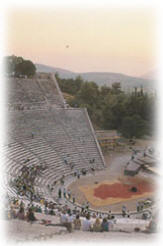 B
B end, I want to explore the urge of creativity--the need we all share for
expressing humanity's attempts at reconciling life with the fears and pains
of living. Today we attempt to impose order and meaning on the meaningless
by redefining the tragic in new social, artistic, and philosophic ways, and
this class will ask the same questions that people have asked for thousands
of years. No matter what your academic interests, the tragic spirit is part
of us all--a universal statement of what it means to be human.
end, I want to explore the urge of creativity--the need we all share for
expressing humanity's attempts at reconciling life with the fears and pains
of living. Today we attempt to impose order and meaning on the meaningless
by redefining the tragic in new social, artistic, and philosophic ways, and
this class will ask the same questions that people have asked for thousands
of years. No matter what your academic interests, the tragic spirit is part
of us all--a universal statement of what it means to be human.
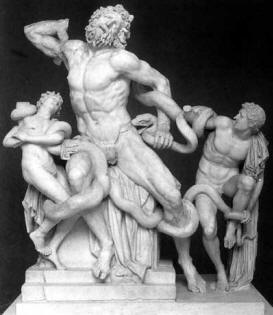
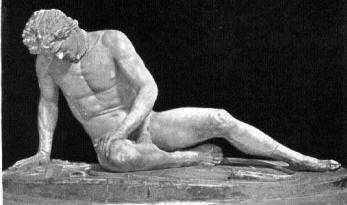
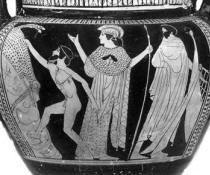 Euripides. Medea. Meridian.
Euripides. Medea. Meridian.